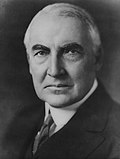United States Senate election in Ohio, 1914
|
|
|||||||||||||||||||||
|---|---|---|---|---|---|---|---|---|---|---|---|---|---|---|---|---|---|---|---|---|---|
|
|||||||||||||||||||||
|
|||||||||||||||||||||

County results
|
|||||||||||||||||||||
|
|||||||||||||||||||||
The 1914 United States Senate election in Ohio was held on November 3, 1914. Republican nominee Warren G. Harding, future President of the United States, defeated Democratic nominee Timothy S. Hogan to succeed retiring incumbent Republican Senator Theodore E. Burton.
Initially, Harding was not interested in running for U.S. Senate, due to the divisive remnants of the 1912 elections between the conservative and progressive factions of the Republican party. Harry Daugherty, an Ohio political boss, was interested in running for the seat himself upon learning of incumbent Senator Theodore Burton's plans to retire upon the expiration of his term, but party leaders advised him not to run. Instead, Daugherty unsuccessfully attempted to stage a draft movement to convince Harding to run for the seat. After the death of Amos Kling, the father of Harding's wife Florence, she encouraged her husband to run. The precise reasoning for this is unknown, but some in Marion, the Hardings' home town, believe that Harding had agreed not to seek higher office as part of a reuniting "truce" between Florence and her father, or that Kling had convinced Harding that it would behoove him to further his business rather than run for public office.
Although Daugherty claimed it was him who had convinced Harding to run for the Senate, Harding's friend and attorney Hoke Donithen, who eventually became Harding's campaign manager, may have played a role in his decision to run. Retiring Senator Theodore Burton also claimed credit, saying to his biographer that Daugherty did not agree to throw his support behind Harding until after learning he had backed him.
...
Wikipedia



